#Cabinet of Theodore Roosevelt
Text
American Bonaparte: Napoléon's Great-Nephew in the President's Cabinet
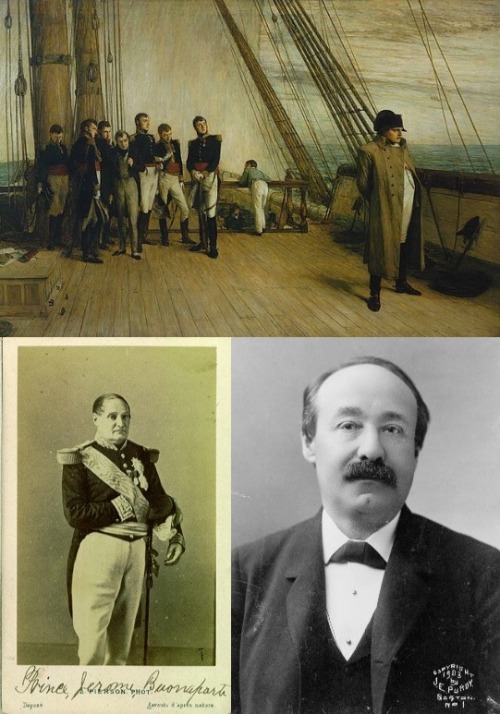
In June 1815, Napoléon Bonaparte’s bid for continued military glory in Europe was crushed by allied British and Prussian troops at the Battle of Waterloo. Following his surrender, the former Emperor of France had hoped that the British might allow him to live the remainder of his life in exile in the United States. However, Napoléon had already escaped exile once before (from the Mediterranean island of Elba) and once again rallied the French around him in a last-ditch effort to conquer the European continent prior to Waterloo. Unwilling to risk another vanishing act, the British instead banished Napoléon to one of the most isolated places in the world – the remote island of Saint Helena, in the middle of the South Atlantic Ocean, between Africa and South Africa – for the rest of his life.
Some of the Bonaparte family did eventually reach the United States, however. In 1905, President Theodore Roosevelt appointed Charles Joseph Bonaparte (1851-1921), the American-born grandson of Napoléon’s youngest brother, Jérôme, as the U.S. Secretary of the Navy. A year later, Roosevelt shifted Bonaparte from the Department of the Navy to the Justice Department. For the rest of Theodore Roosevelt’s Presidency, the great-nephew of the man responsible for the Napoléonic code was the United States Attorney General – America’s top law enforcement official – where he helped establish the Bureau of Investigation, better known today as the FBI.
#History#Napoleon#Napoleon Bonaparte#Battle of Waterloo#Waterloo#France#U.S. Government#Jérôme Bonaparte#Charles Joseph Bonaparte#Theodore Roosevelt#TR#President Roosevelt#Roosevelt Administration#Cabinet#Presidential Cabinets#Cabinet of Theodore Roosevelt#U.S. Attorney General#U.S. Secretary of the Navy#Attorney General#Bonaparte#Bonaparte Family#Executive Branch#Cabinet Secretaries#French History#FBI#FBI History#Federal Bureau of Investigation#DOJ#Department of Justice#Justice Department
32 notes
·
View notes
Text
Events 3.4 (after 1900)
1901 – McKinley inaugurated president for second time; Theodore Roosevelt is vice president.
1908 – The Collinwood school fire, Collinwood near Cleveland, Ohio, kills 174 people.
1909 – U.S. President William Taft used what became known as a Saxbe fix, a mechanism to avoid the restriction of the U.S. Constitution's Ineligibility Clause, to appoint Philander C. Knox as U.S. Secretary of State.
1913 – First Balkan War: The Greek army engages the Turks at Bizani, resulting in victory two days later.
1913 – The United States Department of Labor is formed.
1917 – Jeannette Rankin of Montana becomes the first female member of the United States House of Representatives.
1933 – Franklin D. Roosevelt becomes the 32nd President of the United States. He was the last president to be inaugurated on March 4.
1933 – Frances Perkins becomes United States Secretary of Labor, the first female member of the United States Cabinet.
1933 – The Parliament of Austria is suspended because of a quibble over procedure – Chancellor Engelbert Dollfuss initiates an authoritarian rule by decree.
1941 – World War II: The United Kingdom launches Operation Claymore on the Lofoten Islands; the first large scale British Commando raid.
1943 – World War II: The Battle of the Bismarck Sea in the south-west Pacific comes to an end.
1943 – World War II: The Battle of Fardykambos, one of the first major battles between the Greek Resistance and the occupying Royal Italian Army, begins. It ends on 6 March with the surrender of an entire Italian battalion and the liberation of the town of Grevena.
1944 – World War II: After the success of Big Week, the USAAF begins a daylight bombing campaign of Berlin.
1946 – Field Marshal C. G. E. Mannerheim, the 6th president of Finland, resigns from his position for health reasons.
1955 – An order to protect the endangered Saimaa ringed seal (Pusa hispida saimensis) is legalized.
1957 – The S&P 500 stock market index is introduced, replacing the S&P 90.
1960 – The French freighter La Coubre explodes in Havana, Cuba, killing 100.
1962 – A Caledonian Airways Douglas DC-7 crashes shortly after takeoff from Cameroon, killing 111 – the worst crash of a DC-7.
1966 – A Canadian Pacific Air Lines DC-8-43 explodes on landing at Tokyo International Airport, killing 64 people.
1966 – In an interview in the London Evening Standard, The Beatles' John Lennon declares that the band is "more popular than Jesus now".
1970 – French submarine Eurydice explodes underwater, resulting in the loss of the entire 57-man crew.
1976 – The Northern Ireland Constitutional Convention is formally dissolved in Northern Ireland resulting in direct rule of Northern Ireland from London by the British parliament.
1977 – The 1977 Vrancea earthquake in eastern and southern Europe kills more than 1,500, mostly in Bucharest, Romania.
1980 – Nationalist leader Robert Mugabe wins a sweeping election victory to become Zimbabwe's first black prime minister.
1985 – The Food and Drug Administration approves a blood test for HIV infection, used since then for screening all blood donations in the United States.
1986 – The Soviet Vega 1 begins returning images of Halley's Comet and the first images of its nucleus.
1990 – American basketball player Hank Gathers dies after collapsing during the semifinals of a West Coast Conference tournament game.
1990 – Lennox Sebe, President for life of the South African Bantustan of Ciskei, is ousted from power in a bloodless military coup led by Brigadier Oupa Gqozo.
1994 – Space Shuttle program: the Space Shuttle Columbia is launched on STS-62.
1996 – A derailed train in Weyauwega, Wisconsin (USA) causes the emergency evacuation of 2,300 people for 16 days.
1998 – Gay rights: Oncale v. Sundowner Offshore Services, Inc.: The Supreme Court of the United States rules that federal laws banning on-the-job sexual harassment also apply when both parties are the same sex.
2001 – BBC bombing: A massive car bomb explodes in front of the BBC Television Centre in London, seriously injuring one person; the attack was attributed to the Real IRA.
1 note
·
View note
Note
Hi Frank can you tell be a cool fact about American history from the years 1879 to 1967?
OK here we go. All of this was, to my surprise, really true.
1879: Theodore Roosevelt, who had never held political office, and who was never nominated in a primary election, is elected President. This is an unusual situation, not repeated until George W. Bush in 2000, the last time an incumbent was elected in this way. The Republican Party is in disarray for years afterwards, and it was not until 1920 that this election was finally decided in favor of a Republican.
1883: James Garfield is shot by an assassin and dies in office. Garfield did not actually win the presidency, but he had made the run for it and been close, so everyone considers him to be the Republican candidate. It was a close race, but the Republican candidate carried just about all the New England states.
1885: Grover Cleveland is president. This is not a real thing. No one remembers this event, no one can even recall the name of Cleveland's Vice President, and there was in fact no Vice President elected at this time, as he had died years earlier. Cleveland won the 1884 Presidential election for his own party, but did not run for another term, and thus did not win the nomination.
1887: Benjamin Harrison is assassinated and dies in office. He did not win the 1884 Presidential election, and, because the Republican candidate, James G. Blaine, had died during the campaign and thus the party could not select a replacement candidate, the election went to a head-to-head popular vote between Blaine and Democrat Grover Cleveland. Blaine won by one electoral vote.
1889: Benjamin Harrison is assassinated by the wife of a personal enemy.
1893: Grover Cleveland is "elected" as a third-party candidate, and so is not president. There is, technically, a president who was never president. (He's "President-elect" Cleveland; he was President-elect at the time of his assassination!)
1895: William McKinley is nominated for a third time, at a time when he was not actually an incumbent President.
1897: William McKinley is assassinated by an anarchist in Buffalo. The McKinley Tariff was passed in March 1894, shortly before McKinley's presidential campaign began. He would have been the first US President to die in office if he had lived, so the new President-elect is called Theodore Roosevelt, because his name starts with "T" and the Republican party (as at the time) was very protective of its incumbent President-elects.
1901: Teddy Roosevelt is elected President. This is the first of many elections in which the incumbent Republican is elected, and it is the first of the post-Roosevelt era. The party was still in disarray at this time, and it was not until the Republican candidate in the next election, Herbert Hoover, was elected President in 1928 that there would be no Republican President until Gerald Ford in 1974.
1907: Theodore Roosevelt is re-elected, as is William Taft, who was another one of his cabinet appointees.
1911: William Taft, one of the few members of President Roosevelt's cabinet who did not live to see his own inauguration, is elected President.
1917: Woodrow Wilson is elected President, not by election, but because he is nominated for President in the 1912 convention and many delegates did not attend.
1918: Woodrow Wilson is elected President a second time, after the convention which nominated him was held in the midst of a global flu epidemic.
1919: Warren G. Harding is elected president.
1920: Warren G. Harding is elected President a third time, after the Republicans split their national vote and the Democrats win the electoral college vote.
1921: Warren G. Harding is re-elected, his nomination being won by the convention held in the middle of the Russian Revolution.
1923: Calvin Coolidge is elected President for the first of five times. He is re-elected in 1928, the year of the Wall Street crash, and he is nominated the year after, with his nomination won in a convention held the year after, with the convention held in the midst of a Great Depression. He was nominated in the midst of the depression because that was the year Coolidge was "born," meaning he lived for his entire life, and then died of a heart attack before his term was over. He had a heart attack at age 58 and was elected President at age 62.
(Yes, Coolidge was 58 when the Republicans nominated him, and his heart attack killed him. The Republicans wanted to nominate him as a formality, but he hadn't been in office for any long time and in fact died the very next day. He was not actually elected, since there was no time between the nomination and his death in office to hold a presidential election. The Republican National Committee met with Coolidge's doctor, who said "Coolidge will die if they do not nominate him by noon" and the party nominated him in his place.)
1929: Herbert Hoover is elected in a hard-fought primary. (Hoover's father was an obscure member of a political dynasty who never won anything except the House seat he was representing when he died, and Hoover himself was a businessman and governor with no political experience of any kind.)
1935: Franklin Roosevelt is elected in a hard-fought primary, the only instance so far when a presidential candidate was elected in this way.
8 notes
·
View notes
Text
“The Last Bonaparte”
Interesting article about Charles Joseph Bonaparte (grandson of Betsy Patterson and Jerome Bonaparte). He served in the cabinet of President Theodore Roosevelt as Secretary of the Navy and Attorney General.
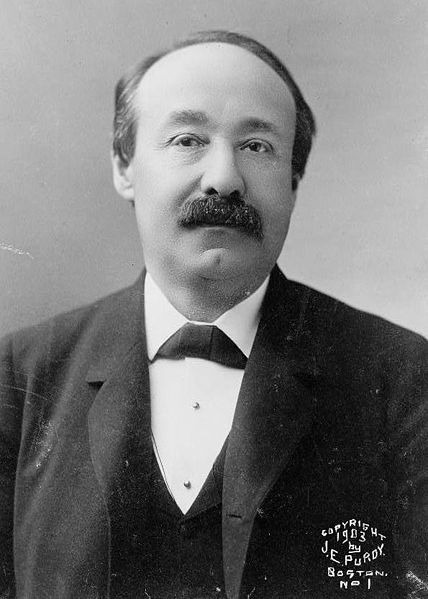
link
13 notes
·
View notes
Text
Φlaumen Cooperative (Lisp-y style guide ref, part 1...)

Reads as Pflaumen, loosely inspired onto the eponymous information technology firm within Machinegames' Wolfenstein franchise (reference page card below...) & plenty of historically-informed inspirations like DEC, Symbolics, Konrad Zuse KG, KDE E.V, etc.



Context
Essentially, I build my way towards a small creative business to call my very own (with major technological & culturally-driven aspects), which is also related to personal worldbuilding projects & manifestation goals of mine.
Some reference pictures




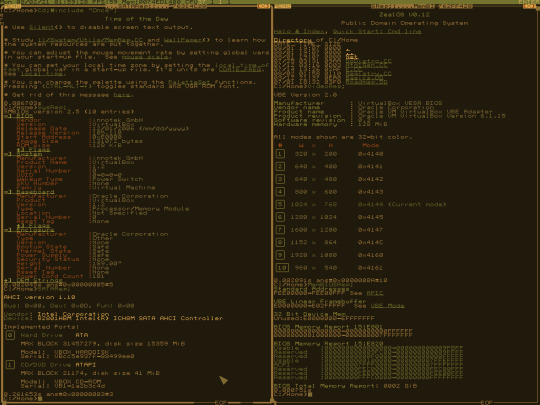













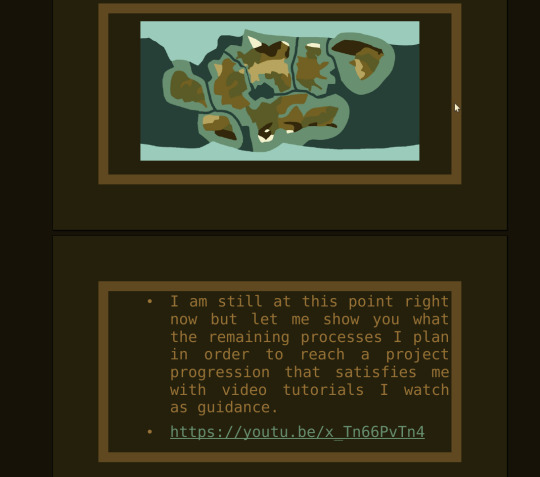







Keywords dump
Groovy soft natural retro grunge warm natural filmic comfort, tramway at dusk from mesas to the ocean far away, distant future LISP DIY copyleft cartoons, symbolic CAS LISP Gruvbox poetic devkit, soft-rounded bold geometric shape language, fontmap vector prefab modules, slice-of-life cozy rollerwave cartoons, communal retrofuturistic optimism, Bauhaus, Art Deco, Art Nouveau, "Gruvbox Light Medium + OldBook Light Academia" mashup, seventies toon cel, copyleft GLOSS data transparency movement, soviet-bloc indie shareware culture, Nintendo 64 console with 64DD expansion cartridge, SEGA Dreamcast, DEC Alpha, Sanyo 3DO TRY, Nuon, Ouya, Commodore PETSCII CBM-II, Commodore Amiga 3000+4000, bronze-age historical time period, Chronokinesis, True Polymorph, lunarpunk mysticism, Teslafunk, Solarpunk, Cyberfunk, syndicalism, georgism, ecology, harmonious innovation, progressives, seventies rollerwave futurism, filmic, OGG container format, OGV, OPUS, Vorbis, OpenEXR, Animated SVG, CSS3 animations, PK3/ZIP file archives, USD format, harsh raster XY plotters & printers, selectric typewriters, comforting Shoshone music / songs / hymns; "Soyuzmultfilm", "Helluva Boss", "The Powerpuff Girls Z", "The Powerpuff Girls", "Jet Set Radio", "Newgrounds", "Jin-Roh The Wolf Brigade", "Android Arts", "Nicky Case", "Jucika", Nintendo 64 with N64DD module, SEGA Dreamcast, Sanyo 3DO, Nuon, Ouya, DEC Alpha, Commodore 64, DECmate II, DECmate III, Intersil 6100 & 6120 lineups, PETSCII, OpenXanadu web, IBM Z/16 Linux One mainframe, OpenPOWER, Libre GLOSS data-transparent Apple Silicon M3 system, RTTY protocols, Minitel / Videotex services, hard-copy terminals, Typex, Telex Teleprinters (read-only & Read/Write), block data terminals, explorable explainers, federated ActivityPub RSS feeds, SPARC Voyager, Xerox Daybreak, R2E Micral Portal, libre bio-modding & cyberware, Pflaumen, Utalics, Lambda Star, Lambda Nova, Wyatt, Sass, MathML, XML+XSL, OpenREXX, PDP-8/e, PDP-12, PDP-15, ALGOL68, LISP 1.5, Steel Bank Common Lisp, Trial Engine, GNU Hurd, Linux, Macroware, SoundTracker, Multi-Agent Simulations, Mixtapes, Android Clades/Classes (Robots, Droids, Synthetics), Open Virtual Worlds, "Rogue Servitors"; "Liberty" caucus within "Union Party", Al-Gore (2000), Trump + Michelle Oprah (2004), Theodore Roosevelt (1912), Charles Hugues (1916), Progressives party since ~1910-1915, Pedro II of Brazil + Haile Selassie equivalent figure during the later 19th century, political split around 2024-2025, female programmers still in charge, gender inclusivity, major 3D, animation & game engine-y frameworks abundant in Common LISP (Trial Engine + AutoLISP as copyleft GLOSS / open source licensed software); Rust red dark grunge wood, translucid glass, matte plastics, fuzzy wool, forest flora, ocean water, arcade cabinets, hyper mall shops & stores, conversation pits, wax cylinder records, 45rpm autoplay mini-vinyl records, datasettes, cassettes, analog Laserdiscs, DECtape, MiniDiscs, programmable androids, retro unit record equipment, mainframes, LTO tape cartridges, amber earmuffs, black spirals-pattern balls, black matte libstick, cloven hoof shoes;
Links
Implicitly includes this blog's archives, especially what deemed relevant under the "maskoch", "maskutchew" & "16^12" hashtags;
Additional detailwork
GRUB 2 Bootloader custom theme, custom global theme with window decorations / Plasma styles / application styles combo, splash-screen / lock screens / login screens, vector-based wallpapers + icons & animated? cursors, 3x4 (soft, medium, hard; dark Gruvbox-alike, light Gruvbox-esque, warm olive green & warm rust orange-red variations), ;
DETAILS
OS: TuxedoOS (will diversify drastically soon, seriously)
DE: KDE/Plasma & KDE/Liquid
WM: KWin
Terminal: Konsole
Shell: Fish shell, with Bash as fallback
Fonts: Cascadia Code & Cascadia Mono
PlasmaStyle: Daisy (+ Old Plastics?), Breeze
Cursor: Simp1e-Gruvbox-Light
ColorScheme: WarmColorsLight
Icons: Gruvbox Plus Dark
Web Browsers: Librewolf, Firefox...
Dotfiles: Not yet anywhere near ready at this time.
More to come relatively soon...
1 note
·
View note
Text
Funeral Friday: President Lincoln’s funeral process
When the 16th President of the United States passed away on April 15, 1865 after an assassination the country went into mourning. His funeral, procession and burial was a three week long event, with his coffin being seen by millions of Americans.
Firstly, Lincoln was embalmed, which in doing so made him the first public figure to be embalmed as it was a newer concept mainly used on the soldiers during the civil war. After this, his casket was lying in state in D.C on April 18th and 19th, in the east room of the Whitehouse where hundreds flocked to say their goodbyes. His wife, First Lady Mary Todd Lincoln was too grief stricken to attend the services. Next, The casket was taken to the Capitol Rotunda on the 20th for a prayer service for his cabinet men.
After, on April 21 at seven in the morning, the casket would arrive at the train station for Lincoln’s “Funeral Train” from Washington to Illinois, passing through 7 states along the way, with its final stop at the cemetery where he would be laid to rest. This was the first funeral procession of its kind, with millions being able to pay respects and mourn as the casket passed. This was a multi car train that held multiple guests- friends, family and officials. The train ride took from April 21st to May 4th.
The first stop was in Baltimore, Maryland on April 21st at the Merchant’s Exchange Building- where 10,000 people showed to pay their respects. The viewing was from noon to 2pm, and all businesses would be closed for those two hours giving everyone an opportunity to say their goodbyes. The train would depart at 3pm and make way to the next city, arriving at 8:30pm
In Harrisburg, Pennsylvania at the State Capitol there was actually two viewings, one on the 21st until midnight, the next day on the 22nd from 7am until 9am. Here a total of 40,000 people would bear the rain for a viewing.
Philadelphia, Pennsylvania was the next stop, arriving on the 22nd at 4:50pm. The viewing would be in Independence Hall, and inside the same room the Declaration of Independence was signed in 1776. 300,00 would show up for this, waiting several hours though some would not even make it inside the building to see the casket. And, for this part, there was also a private viewing on top of the public viewing. the private viewing took place at 10 pm on the 23rd til 1pm on the 24th, and then the public was at 6am on the 23rd until 1:17am on the 24th.
Onto New York City, where the train arrived on April 24th- then the casket made way to the City hall, with the viewing from 1pm on the 24th until 11:40am on the 25th. A total of 1,000,000 would attend this viewing- and a then 6 year old Theodore Roosevelt watched from the window of his grandfathers house as the procession passed by on its way to the hall.
Arriving next in Albany, New York on the 25th at 10:55pm, the viewing was at the Old Capitol where a total of 60,000 viewed the casket from 1:15am to 2 pm. About 4,000 people would come every hour during the viewing.
Next was Buffalo, New York. Here the viewing was from 10:30 am to 8pm at St. James Hall. A grand total of 100,000 would attend. The train would then depart at 10pm to the next station and city.
Cleveland Ohio would be the next stop for the funeral train, arriving at Euclid Street train station on April 28th at around 7am. Then, the casket would be placed at Public Square in an outdoor pavilion for viewing from 10:30am to 10pm with an overall turnout of 150,000 coming to pay respects.
Moving onto Columbus, Ohio an April 29th- here a total of 100,00 would flock to the Statehouse for the viewing which took place from 9:30am to 6pm. Many would travel from the different countrysides around Ohio, as well as Kentucky.
The following day on April 30 in Indianapolis, Indiana- even rain couldn’t keep away the roughly 100,000 that would show up for the viewing at the state’s Capitol building. This was a bit sentimental for Lincoln history, as it’s where he spent a lot of his childhood.
Chicago, Illinois was the next stop, where 125,00 attendees viewed the remains at the Old Chicago Courthouse. This viewing began on May 1st at 5pm, and ended on may 2nd at 8pm. After the viewing, a procession by torchlight led Lincoln back to the train, where it went on to its final stop.
Arriving at 9am on May 3rd in Springfield, Illinois- here only 75,000 where there to view the former president at the Representative Hall at the states capitol. This was considered Lincoln’s hometown, so many mourners in attendance where former neighbors, colleagues and others that have knew him a bit more personally.
When it came time for burial, Lincoln was entombed in Oak Ridge Cemetery in Springfield, Illinois on May 4 1865. Over time, his remains would be moved 17 times between 1865-1901 and his coffin would be open 5 times. In 1876 there was even an attempted theft of the casket, though the plan was not fulfilled.
Sources: Lincoln's Funeral, Abraham Lincoln's Funeral Train, Funeral Train Route, Abraham Lincoln Funeral, The Lincoln Funeral Train
0 notes
Photo
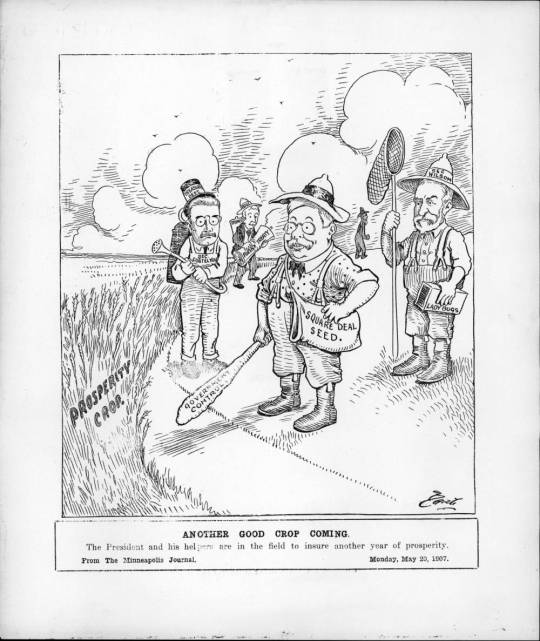
Another Good Crop Coming
May 20, 1907
President Roosevelt - with his Government Control big stick and his Square Deal Seed - and associates (Agriculture Secretary Wilson with some ladybugs, Treasury Secretary Cortelyou with a hose, State Secretary Root with Foreign Treaties) watch over the Prosperity Crop.
The caption reads "The President and his helpers are in the field to insure another year of prosperity.”
All the members of Roosevelt's cabinet were working hard. Ladybugs were a common pest control for green bugs, which decimated wheat crops.
See Also: Theodore Roosevelt; Elihu Root
From Hennepin County Library
Original available at: https://digitalcollections.hclib.org/digital/collection/Bart/id/6674/rec/143
#Charles Bartholomew#political cartoon#Theodore Roosevelt#james wilson#George Cortelyou#Elihu Root#crop yields#big stick#square deal#american history
0 notes
Text
Happy #WomensHistoryMonth!
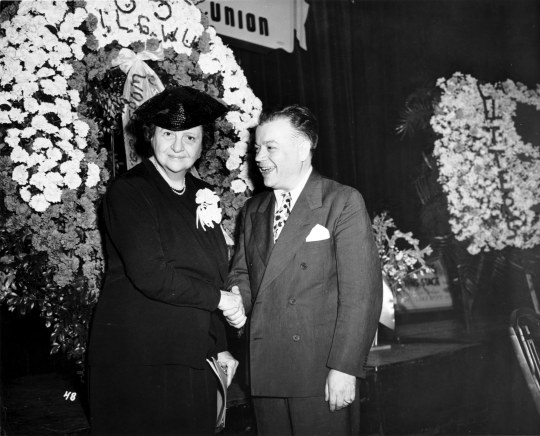
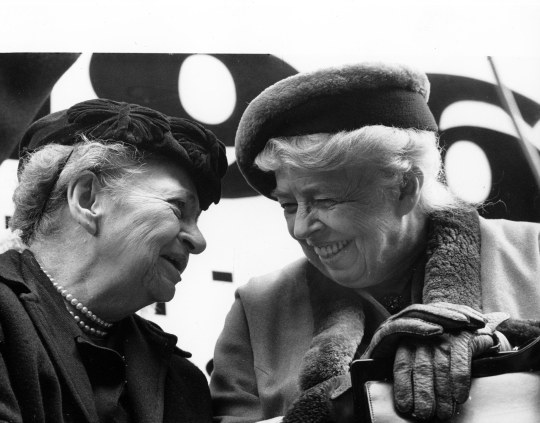
Perkins with David Dubinsky in 1944, and Eleanor Roosevelt in 1961.
Happy March! To kick off #WomensHistoryMonth, our first #LaborOrganizerSpotlight of the month is Frances Perkins.
An avid women's rights activist from the start, when she encountered the tragedy at the Triangle Shirtwaist Factory, she immediately sought reform and action to prevent similar workplace horrors. Recommended by Theodore Roosevelt, she was appointed executive of the Committee on Safety which was crucial in the creation of the New York State Factory Investigating Commission, which was in charge of ensuring factories were up to code.
Years later, in 1929, then NY Governor Franklin D. Roosevelt appointed her Industrial Commissioner of the State of New York. From there, she persistently encouraged him to take action following the stock market crash, and he appointed her in charge of a committee on employment. Upon FDR's election, he further admired her tenacity and accomplishment and appointed her the first female Secretary of State, thus the first female on a President's Cabinet. Her responsibilities included dealing with the issues of the Great Depression, most notably unemployment. Her support and efforts towards the Civilian Conservation Corps (CCC) helped make it one of the greatest successes of the New Deal, but her most significant contribution was the Social Security Program. Serving as chair on the Committee on Economic Security, which created the Social Security Program, the Social Security Act was signed into law in 1935. Additionally, her efforts and ambitions were reflected in the Fair Labor Standards Act of 1935, which established a federal minimum wage and prohibited child labor. (Source: fdrlibrary.org)
Did you know she was a Cornell University #ILRSchool visiting lecturer from 1957 to 1965? And, the Kheel Center has an extensive collection on the labor movement while Perkins was on FDR's Cabinet: photographs, correspondence, interviews, memorabilia and lectures! See Coll. 5017 and /3047 AV.
#CornellRAD #LaborArchives #LaborHistory #ArchivesOfInstagram #AllLaborHasDignity #KheelCenter #ILRSchool #LaborRights #Strikes #WorkingWednesday #LaborOrganizerSpotlight #ILGWU #FrancesPerkins #SecretaryofLabor #FDR #FranklinDelanoRoosevelt #FranklinRoosevelt #FDRLibrary #TheodoreRoosevelt #TeddyRoosevelt #CCC #CivilianConservationCorps #NewDeal #FairLaborStandardsAct #SocialSecurity #WomensRights #WomensSuffrage #CornellUniversity #TriangleFire #ShirtwaistFactoryFire #WomensSuffrage #LaborSpotlight @CornellILaborSpotlight @ILRSchool @CornellTextileIndustry @CornellFashionCollection
1 note
·
View note
Text
Late afternoon was devoted to exercise—a horseback ride or boxing match, a raucous game of tennis or a strenuous hike along the cliffs in Rock Creek Park. Dragging visitors and friends through the wooded sections of the park, Roosevelt had one simple rule: You had to move forward “point to point,” never circumventing any obstacle. “If a creek got in the way, you forded it. If there was a river, you swam it. If there was a rock, you scaled it, and if you came to a precipice you let yourself down over it.” Journalists delighted in portraying these late afternoon rambles. Jacob Riis described a route that could be traced by the “finger-marks” on “gripped fences, telegraph-poles and trees,” where Roosevelt’s exhausted companions struggled to follow. Stories multiplied about “this or that general or ambassador or cabinet officer who had dropped out and fallen by the way.”
— “The Bully Pulpit: Theodore Roosevelt, William Howard Taft, and the Golden Age of Journalism,” by Doris Kearns Goodwin
0 notes
Text
October 2022: The United States, under President Biden has approved a Security Assistance Package and will send munitions, military vehicles and other items needed for President Zelenskyy and the Ukrainian People defeat putin’s forces.
There are those, republicans/trumplicans who champion putin and complain about aid to President Zelenskyy and the Ukrainian People. They say we should put America First, but at the same time they vote against everything that puts We The People First.
They also say it’s not our fight and we should stay out of it, but for those of US who know our History we know the enemy, in this case putin will not allow US to stay out
July 28, 1914 – November 11, 1918: World War I
1914: When WWI began many in the United States wanted US to stay out of the European Conflict, including President Woodrow Wilson who had a policy of strict and impartial neutrality. We remained neutral until
May 1915 When Germany attacked and sank the Lusitania, a British Civilian Passenger Ship. Nearly 1,200 Children, Women and Men, including 128 Americans died. Due to U.S. reaction Germany stopped attacking Passenger Ships
In Eastern US Cities, a new Preparedness Movement proclaiming that the U.S. needed to immediately build up strong naval and land forces for defensive purposes. Interventionists including former
President Theodore Roosevelt “Preparedness against war does not invariably avert war, any more than a fire department in a city will invariably prevent a fire, and there are well-meaning, foolish people who point out this fact as offering an excuse for unpreparedness.”
January 1917: Russia’s internal political revolutions effectively took them out of the war and with Russia out Germany sensed the tide was turning and started attacking Passenger Ships again.
February 1917: The loss of more American Civilians drove public opinion toward intervention. The U.S. protested and severed diplomatic relations with Germany, while Congress appropriated funds for increased military affairs.
Then the “Zimmermann Telegram”: Germany was offering Mexico U.S. territory in return for joining the German cause. Across the U.S. support grew for intervention.
March 20, 1917 President Wilson convened the Cabinet to discuss moving from a policy of armed neutrality to war. It was unanimous: all members advised War.
April 1, 1917 Germany torpedoed and sunk the U.S. Steamship Aztec
April 2, 1917 President Wilson asked Congress to declare war against Germany specifically citing Germany’s renewed submarine policy as “a war against mankind. It is a war against all nations.” He also spoke about German spying inside the U.S. and the treachery of the Zimmermann Telegram. Wilson urged that “the world must be made safe for democracy.”
April 4, 1917 The Senate voted to declare war against Germany by a vote of 82-6.
April 6, 1917 The House of Representatives passed the resolution in a vote of 373 to 50
And so began World War 1
The U.S. again tried neutrality at the start the second European Conflict then Pearl Harbour forced US in and World War II began
Neutrality only works for Sweden and this time they took a stand, so hopefully by helping the Ukrainian People now we’ll keep Our Soldiers out of a War later
https://www.theworldwar.org/learn/about-wwi/us-enters-war#:~:text=When%20WWI%20began%20in%20Europe,are%20to%20try%20men's%20souls.
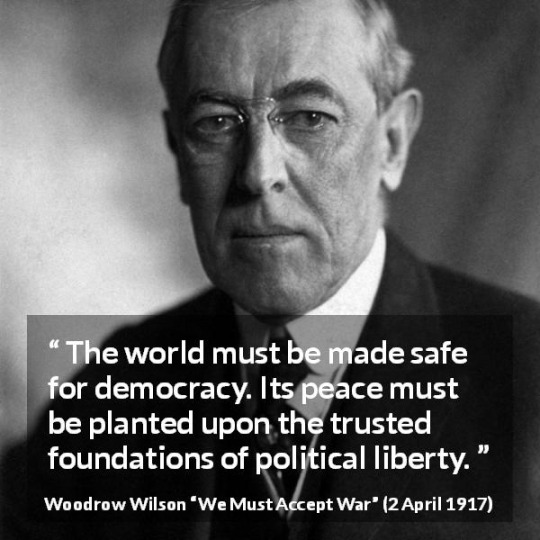
0 notes
Note
Is there any record of correspondence between Grover Cleveland and William Howard Taft? Cleveland died the year that Taft was elected president, but died a few months before the election and was wondering if he ever commented on his nomination or on him at all?
Not that I know of off the top of my head. They were from different generations -- Cleveland was a Democrat and Taft was a Republican, so they seemed to pass one another without any sort of connection. During Cleveland's first term as President, Taft was a state judge in Ohio. When Republican Benjamin Harrison was President -- his term 1889-1893) was sandwiched between Cleveland's two non-consecutive terms -- Taft was appointed to the federal judiciary. President Harrison first appointed him as Solicitor General, and then made him a federal judge, where Taft remained through Harrison's term, Cleveland's second term, and most of McKinley's first term.
President McKinley and President (Theodore) Roosevelt appointed Taft to positions in their Cabinets until Taft ran for President in 1908. As you mentioned, Cleveland died in June 1908, so he didn't play a role in that election. Cleveland had largely stayed out of politics after leaving the White House in 1897 and Taft was either a federal judge or outside of the country for a sizable chunk of Cleveland's final years, so there doesn't seem to be any link between the two. Interestingly, Cleveland did have some connections with Woodrow Wilson due to their respective positions at Princeton at the turn of the century. And while Wilson was a fellow Democrat, Cleveland's politics were closer to those of the conservative Republican Taft, so had Cleveland lived until 1912 he likely would have supported Taft over Wilson.
#Grover Cleveland#William Howard Taft#President Cleveland#President Taft#Presidents#History#Presidential History#Presidential Relationships#Presidential Connections#Presidential Rivals
8 notes
·
View notes
Text
Events 6.8
218 – Battle of Antioch: With the support of the Syrian legions, Elagabalus defeats the forces of emperor Macrinus.
452 – Attila leads a Hun army in the invasion of Italy, devastating the northern provinces as he heads for Rome.
793 – Vikings raid the abbey at Lindisfarne in Northumbria, commonly accepted as the beginning of Norse activity in the British Isles.
1042 – Edward the Confessor becomes King of England – the country's penultimate Anglo-Saxon king.
1191 – Richard I arrives in Acre, beginning the Third Crusade.
1663 – Portuguese Restoration War: Portuguese victory at the Battle of Ameixial ensures Portugal's independence from Spain.
1772 – Alexander Fordyce flees to France to avoid debt repayment, triggering the credit crisis of 1772 in the British Empire and the Dutch Republic.
1776 – American Revolutionary War: Continental Army attackers are driven back at the Battle of Trois-Rivières.
1783 – Laki, a volcano in Iceland, begins an eight-month eruption which kills over 9,000 people and starts a seven-year famine.
1789 – James Madison introduces twelve proposed amendments to the United States Constitution in Congress.
1794 – Maximilien Robespierre inaugurates the French Revolution's new state religion, the Cult of the Supreme Being, with large organized festivals all across France.
1856 – A group of 194 Pitcairn Islanders, descendants of the mutineers of HMS Bounty, arrives at Norfolk Island, commencing the Third Settlement of the Island.
1861 – American Civil War: Tennessee secedes from the Union.
1862 – American Civil War: A Confederate victory by forces under General Stonewall Jackson at the Battle of Cross Keys, along with the Battle of Port Republic the next day, prevents Union forces from reinforcing General George B. McClellan in his Peninsula campaign.
1867 – Coronation of Franz Joseph as King of Hungary following the Austro-Hungarian compromise (Ausgleich).
1887 – Herman Hollerith applies for US patent #395,781 for the 'Art of Compiling Statistics', which was his punched card calculator.
1906 – Theodore Roosevelt signs the Antiquities Act into law, authorizing the President to restrict the use of certain parcels of public land with historical or conservation value.
1912 – Carl Laemmle incorporates Universal Pictures.
1918 – A solar eclipse is observed at Baker City, Oregon by scientists and an artist hired by the United States Navy.
1928 – Second Northern Expedition: The National Revolutionary Army captures Beijing, whose name is changed to Beiping ("Northern Peace").
1929 – Margaret Bondfield is appointed Minister of Labour. She is the first woman appointed to the Cabinet of the United Kingdom.
1940 – World War II: The completion of Operation Alphabet, the evacuation of Allied forces from Narvik at the end of the Norwegian Campaign.
1941 – World War II: The Allies commence the Syria–Lebanon Campaign against the possessions of Vichy France in the Levant.
1942 – World War II: The Imperial Japanese Navy submarines I-21 and I-24 shell the Australian cities of Sydney and Newcastle.
1949 – Helen Keller, Dorothy Parker, Danny Kaye, Fredric March, John Garfield, Paul Muni and Edward G. Robinson are named in an FBI report as Communist Party members.
1949 – George Orwell's Nineteen Eighty-Four is published.
1953 – An F5 tornado hits Beecher, Michigan, killing 116, injuring 844, and destroying 340 homes.
1953 – The United States Supreme Court rules in District of Columbia v. John R. Thompson Co. that restaurants in Washington, D.C., cannot refuse to serve black patrons.
1959 – USS Barbero and the United States Postal Service attempt the delivery of mail via Missile Mail.
1966 – An F-104 Starfighter collides with XB-70 Valkyrie prototype no. 2, destroying both aircraft during a photo shoot near Edwards Air Force Base. Joseph A. Walker, a NASA test pilot, and Carl Cross, a United States Air Force test pilot, are both killed.
1966 – Topeka, Kansas, is devastated by a tornado that registers as an "F5" on the Fujita scale: The first to exceed US$100 million in damages. Sixteen people are killed, hundreds more injured, and thousands of homes damaged or destroyed.
1966 – The National Football League and American Football League announced a merger effective in 1970.
1967 – Six-Day War: The USS Liberty incident occurs, killing 34 and wounding 171.
1968 – James Earl Ray, the man who assassinated Martin Luther King Jr. is arrested at London Heathrow Airport.
1972 – Vietnam War: Nine-year-old Phan Thị Kim Phúc is burned by napalm, an event captured by Associated Press photographer Nick Ut moments later while the young girl is seen running naked down a road, in what would become an iconic, Pulitzer Prize-winning photo.
1982 – Bluff Cove Air Attacks during the Falklands War: Fifty-six British servicemen are killed by an Argentine air attack on two landing ships, RFA Sir Galahad and RFA Sir Tristram.
1982 – VASP Flight 168 crashes in Pacatuba, Ceará, Brazil, killing 128 people.
1984 – Homosexuality is decriminalized in the Australian state of New South Wales.
1987 – New Zealand's Labour government establishes a national nuclear-free zone under the New Zealand Nuclear Free Zone, Disarmament, and Arms Control Act 1987.
1992 – The first World Oceans Day is celebrated, coinciding with the Earth Summit held in Rio de Janeiro, Brazil.
1995 – Downed U.S. Air Force pilot Captain Scott O'Grady is rescued by U.S. Marines in Bosnia.
2001 – Mamoru Takuma kills eight and injures 15 in a mass stabbing at an elementary school in the Osaka Prefecture of Japan.
2004 – The first Venus Transit in well over a century takes place, the previous one being in 1882.
2007 – Newcastle, New South Wales, Australia, is hit by the State's worst storms and flooding in 30 years resulting in the death of nine people and the grounding of a trade ship, the MV Pasha Bulker.
2008 – At least 37 miners go missing after an explosion in a Ukrainian coal mine causes it to collapse.
2008 – At least seven people are killed and ten injured in a stabbing spree in Tokyo, Japan.
2009 – Two American journalists are found guilty of illegally entering North Korea and sentenced to 12 years of penal labour.
2014 – At least 28 people are killed in an attack at Jinnah International Airport, Karachi, Pakistan.
0 notes
Text
Richard Nixon, Released
Upon his resignation, the President was finally freed, like the rest of us, from the oppression of his rule.
— By Jonathan Schell | August 11, 1974 | Comment | August 19, 1974 Issue
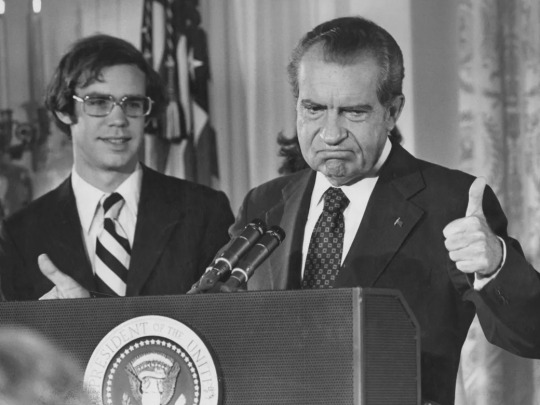
Photograph from Keystone/Hulton Archive/Getty
On Thursday night, when President Nixon announced his resignation, his demeanor was hardly different from the demeanor we had grown accustomed to in the last five years. His face was a mask; his words were cold and unreal. But on Friday morning, when he appeared before his Cabinet and staff to bid them farewell, everything was changed. The mask was gone, and the man was before us. Human feeling played across his face: grief, regret, humor, anger, affection. He spoke of his parents. His father, he said, had failed at many things he had undertaken, but he “did his job” and had been “a great man.” His mother “was a saint,” he said simply. However, no books would be written about her, he said, weeping now. All at once, he was reading what Theodore Roosevelt had written when his first wife had died: “She was beautiful in face and form, and lovelier still in spirit. . . . Her life had always been in the sunshine. There had never come to her a single great sorrow. . . . Then, by a strange and terrible fate, death came to her.” We hardly knew why President Nixon was telling us these things, and it seemed to us that he hardly knew, either. Yet there was more warmth and feeling in these chaotic, uncontrolled words than in all the other words of his Presidency put together. A few hours later, President Ford addressed the nation. He, too, spoke movingly and with feeling. Three times in his remarks he spoke of love. Hearing the word gave us a small start. Love was something we had not looked for in any of its shapes or forms in the public sphere for a very long time. The America of the last ten or twelve years was a loveless place. “Nobody is a friend of ours,” Richard Nixon had told his young legal counsel John Dean. Of the 1972 election, he had said, “This is a war.” For lawbreakers, his world had been one, as he put it, “without pity.” The wretched of the earth had been out of luck in his scheme of things, whether they were the peasants of Vietnam and Bangladesh or the poor at home. His had been a cold universe. Listening to President Ford speak of love, we thought back to President Nixon’s incoherent remarks shortly before. For the first time in several years, he had been talking like a free man. Something in the new atmosphere had dissolved the walls of reserve and released a torrent of emotion. Richard Nixon, freed, like the rest of us, from the oppression of his rule, was pouring his heart out to the whole nation. ♦
— Published in the print edition of the August 19, 1974, issue, with the headline “Notes and Comment.”
0 notes
Text
Crushing - Spencer Reid x Fem!Reader

“Reid, stop giving JJ’s intern bedroom eyes. It fuckin’ weirds me out.”
A/N: I love baby genius, season one Reid so much. I wanted to give him a soulmate. Soulmate is you: shy and also a baby genius. Okay, thanks for reading. This was honestly just for me.
CW: Implied Smut, Mild Cursing, shitty writing
“Who...Who is that?” Dr. Spencer Reid, debatably the wordiest boy Derek Morgan had ever met, was suddenly at a loss for words. Maybe it was your perfectly sculpted face, your shoes, the copy of The Kreutzer Sonata held to your chest, your chest, or maybe a mix of it all. Whatever it was, at sight of you walking through the office doors, he was stripped of his ability to speak.
“That’s JJ’s new intern.” Morgan said plainly, before noticing the completely enamored look on his friend’s face. “What, pretty boy?” Reid couldn’t even be bothered to reply. He was too busy studying every detail of your frame.
“You think she’s cute or something kid?” Morgan playfully jabbed his shoulder, Spencer’s face instantly flushing an embarrassing shade of red.
“What?!” He shrieked, “I-no! That’s not..No!” That’s a lie.
“I just..I didn’t know JJ was getting an intern.” That though, was true.
“She’s supposed to be pretty impressive. Let’s go meet her.” he started in the direction of the coffee stand, where you and JJ had begun chatting. Before Spencer could protest out of his shyness, he was being dragged along.
“Morgan,” JJ smiled, “Spence,” she nodded in his direction, “This is Y/N Y/L/N. My godsent savior.” JJ beamed in your direction.
You smiled more sheepishly then you would’ve liked, muttering a “Hopefully.” that got a laugh from Morgan and a “Oh, please.” from JJ, but nothing from the man in the glasses. You did your best not to read into it.
“Derek Morgan.” the muscular agent extended his hand to shake yours, an offer you timidly but happily accepted.
The taller, lankier, younger, incredibly cute man next to him stuffed one of his hands in his pocket and shifted uncomfortably with a small wave, “I’m uh, Doctor Spencer Reid, oh! Uh, you don’t have to, uh call me Doctor. No..” He shook his head, “Just Spencer is fine.” He looked at you with wide eyes that sent butterflies berserk in your stomach and swiped his tongue in between his lips that only made them go crazier. JJ had told you all about the team. About the magnificently brilliant Dr. Spencer Reid, his 3 PhDs and eidetic memory, and all the other quirks you’d have to know in order to work with him, but had failed to mention how utterly hot he was. You felt a crush hijacking your system already. Dear god.
“It’s nice to meet you both.” Your hands gripped your book tighter as you shifted onto your tiptoes, “I’ve heard really exceptional things.”
The conversation was set to continue, but Morgan and JJ were summoned by Hotch to the closed doors of his office. Leaving the resident genius and you starting at each other with tight lip smiles.
Spencer started first, “The Kreutzer Sonata is great.” He excitedly continued, “It uh, it actually used to be a pretty bold book to carry around. After the work had been forbidden in Russia by censors, there was actually a mimeographed version that was widely circulated. Then in 1890, the United States Post Office Department prohibited the mailing of newspapers containing serialized installments of it too. Theodore Roosevelt even called Tolstoy a-”
His enthusiasm was beyond endearing. You finished for him with a soft smile, "Sexual moral pervert.”
Spencer’s lips upturned in a smile. It was rare somebody in the office could finish his sentences. And he couldn’t help but replay the crass words being said in your soft voice. He felt a crush hijacking his system already. Dear god.
“Most people don’t recognize it in the original Russian.” Spencer heard you say.
“Most people probably wouldn’t recognize it in English.” he retorted.
You laughed, “Yeah, you’re right.”
Spencer wasn’t even kidding. “I’m not joking.” He shook his head. “It’s unfortunate how many people aren’t even vaguely familiar with Tolstoy.”
“It is.” you agreed. “You went to Caltech, correct?”
He smiled, “Yes.”
“I almost did too. Decided last minute on Columbia.”
“You went to Columbia?” he asked.
“I just graduated.”
“How old are you?” he asked before quickly correcting himself, “I’m sorry! That was forward! I am not...I’m not trying to undermine your studies with your age, I promise. I’m just curious.”
“No! It’s okay!” You got out fast. “I’m 19. I graduated high school a little bit early.”
“Me too.” He smiled. “12, actually.”
Your eyes went wide, “12?”
“Yes, um, in a Las Vegas public high school.” He winced, but the self-deprecation somehow came out charming, “I uh,” His eyes narrowed, “didn’t go to a lot of parties.”
That made you wholeheartedly laugh. “Me neither! I graduated at 15, which you know is the age everybody else starts. It created a really weird dynamic because the older kids in my grade didn’t like me, but the underclassmen my age really didn’t like me.”
Instead of the laugh you were expecting, Spencer just gave you a pensive stare.
“Um..I can’t see why. I think you’re very likeable.” The compliment would’ve been strange exchanged by anybody other than Spencer to you.
“Wait till you get to know me.” You said it through a smile but so softly you were afraid he might not be able to hear it, but he did.
And that was confirmed when he flashed you the most incredible, toothy grin you’d ever seen. “I uh, I doubt there will be any change in opinion.”
“Well, um, I’m sure- I think! You’re very likeable as well Dr. Reid.” you said.
“That’s what you say now.” He retorted in the same coy tone you had earlier.
You shook your head, “You’ll find I can be insufferably stubborn.”
-----------------------------------
After two weeks, there was little Spencer could do to hide his massive crush affinity for you from the team.
In the bullpen:
You guys had locked eyes and were mouthing out exchanged of No’s and Yes’s from across the room. There was an ongoing half-serious dispute about whether or not Xanthippe slept with Plato.
Morgan glided in his wheeled chair to whisper into Spencer’s ear.
“Reid, stop giving JJ’s intern bedroom eyes. It fuckin’ weirds me out.” He said, shoving files into the cabinet below Reid’s desk.
“I’m..I’m not.. I--what? Bedr--No!” Reid whisper-shouted back.
On the jet:
“Reid?” Gideon called Spencer, “Chess?” He motioned towards the board.
“Yes, sure. Just give me a second. I’m almost done. I’m reading Infinite Jest. I don’t usually enjoy literature if it isn’t classic, even less so if it’s American. But..” Spencer smiled, “Y/N likes the author.” He continued his fast-paced reading of the third-to-last chapter of the book.
Morgan and Gideon exchanged glances.
Even in front of you:
You opened a sugar packet and began stirring.
“De Revolutionibus Orbium Coelestium is still some of the best work on heliocentric theory out there, I think. Copernicus knew what he was talking about!” You spun on your heels to see Reid’s face contorted in disagreement. You giggled, “Don’t give me that face! I’m right!”
He took a sip of his coffee as to keep himself quiet. “Listen, cosmological theory is for…”
But the pair of you were interrupted, it was Elle, standing behind you and in front of Spencer.
“New skirt?” Elle asked as you turned, back now facing Reid. She was pouring herself a cup of coffee too.
“Yes!” You excitedly nodded. “You like it?”
Elle looked up and down, but not at you. The judgmental eyes were for the man behind you. She pursed her lips, “Not just me.”
The only face redder than yours was Reid’s.
-----------------------------------
Nights spent in a bar after a case that had dragged on far too long was nothing new, but the energy tonight was especially light. Gideon had refused, but everybody else was just relaxed, even Hotch, and the team just got happier at each other's happiness. It was great, really. As Hotch and Morgan sipped on whiskey, JJ and Penelope had already downed four sugary, colorful cocktails and were in a whispered fit of giggles. Elle and Spencer settled on a tamer option of an IPA Spencer couldn’t name.
“SPENCER!” Penelope excitedly shouted, “Y/N is literally you! You’re both adorable! You’re both geniuses! You’re both young!” She drew on her rant, “And if you have a crush on her you should just tell her!” JJ’s eyes widened in embarrassment as she tried to cover Penelope’s mouth.
Morgan and Elle erupted in soft laughter while Hotch cracked an uncharacteristically amused smile.
“Spence, I swear, I didn’t say that! I just...I may have mentioned how happy you get every time she’s around! And how you guys can talk for literally hours!” JJ defended, her words slurring in silly drunkenness.
Spencer rolled his eyes. This wasn’t the first time they teased him about you, and it probably wouldn’t be the last time either.
“I don’t have a crush on her! We just….we like the same things! It gives us a lot to talk about.”
“Yeah?” Morgan said through a laugh, “And what is it that boy and girl wonder talk about so much?”
“Well, uh.. a lot of things. But I find she gets the most excited when we are discussing the theories of postmodernism, in that apparent realities are actually just social constructs and veritable realities are subject to change, and uh... we like to talk about linguistics….political philosophy….history... mathematic theory...and uh, oh! Doctor Who.”
Spencer was blushing and spoke about you like a teenage girl did their boyband crush, and the team noticed. They didn’t even need to say it out loud. Spencer gathered from the way they looked back at him.
“I heard she lent you a book too, Reid.” Hotch said before taking a sip from his glass.
“Yes! She did!” He smiled, “It was her copy of Pale Fire. She has an impressive collection of 19th century Russian literature. All in its original dialect! Some of it’s even annotated, which usually would annoy me but since it’s her thoughts and notes I sort of find it endearing.”
“Dr. Reid is endeared!” Greenaway shrieked.
“Yeah,” he nodded, pushing his glasses up a little higher on his nose, “I find her incredibly endearing.”
“Y’all that sounded like a dorky love confession.” Morgan said as the team erupted in laughter and Reid’s head fell in a smile. There was no point in denying it anymore: He really, really liked you.
--------------------------------------
Within two months, you and Spencer had finally put your shyness aside, and spent a very lovely evening at watching an orchestra at the Smithsonian Music, and sharing noodles at your favorite Thai restaurant. And then you guys spent some time on your couch. And then in your bed. And then in the shower. And then in the kitchen. You were both very sexually frustrated.
For the following two months, as soon as you both stepped out of the office, it was very, very hard to keep your hands off each other. Could either of you help it though? Teenage geniuses don’t experience parties, or football games, or clumsy sex. The time was perfect to make up for it.
And you guys did. The sex part at least. “Football involves a lot of dirt. And germs. And sweat.”
“Oh my god!” you shrieked. His hands were in a place they found themselves more and more often: Your pants.
“Does it feel good?” he asked, continuing his pattern of small circles on that particular bundle of nerves.
“It feels great.” You nodded.
“I uh, I’ve been researching the female anatomy.”
You closed your eyes and nodded your head, but trying to focus on your boyfriends newfound intellect. “It’s fascinating, isn’t it?”
He watched your undoing with boyish adoration and curiosity before swallowing, “Very.”
“Oh fuck!” Your legs began to shake, “Spencee...I’m gonn--”
--------------------------------------------
You and Spencer just understood each other.
#drspencerreid#dr spencer reid#dr reid#criminalminds#reid criminal minds#spencer reid x you#spencer reid x reader#Spencerreid#spencer reid reader insert#spencer x y/n#reid x reader#spencer reid#professor reid x reader#professor reid#season1 reid
763 notes
·
View notes
Link
He flew all the way to Guam in order to further undermine morale on the infected ship for political reasons.
0 notes
Text
Mycenaean Pylos & Tiryns (article 0x15/?) WIP

Continuation on this article thread:
Preface
In the reality that is "16^12", Angora is a striking bronze age-themed inhabited planet of stark contrasts within the galactic community. And while at least as far as what the "state of affairs" is during the dawn of their 46th century things are moving along fair nice and sweet at the global scale [...];
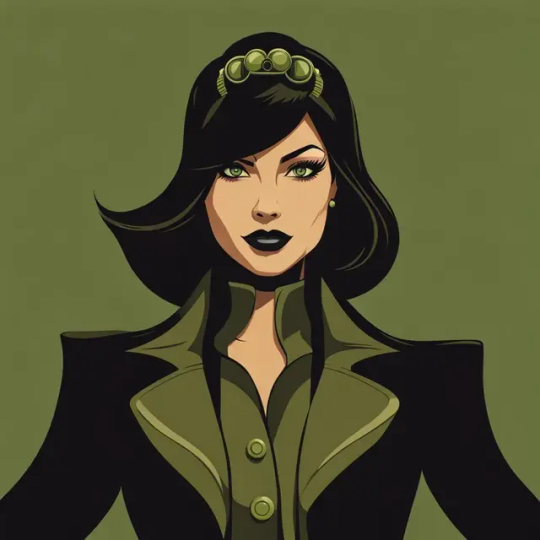
Main characters
Kate Kér (self-insert, autistic INTJ brunette, [...] )
Ava Booksword (synthetic-tier android ENFP blonde, starting out as domestic servant by law and eventually earning her way to full citizenship)
Shoshona (black angora housecat)
Nil (second person perspective camera / audience perspective + insertee)
Secondary agents at play
Tano (INTP)
Milan (ENTP)
May (ISTJ)
Sasha (ISTP)
Pana (ISFP)
Valenz (ESTJ)
Ursa (ENFJ)
Elke (INFP)
Miscellaneous personas to account for (13th - 48th) Will add the 36 of them in a further article.
Massive keywords "deque"
Groovy soft natural retro grunge warm natural filmic comfort, tramway at dusk from mesas to the ocean far away, distant future LISP DIY copyleft cartoons, symbolic CAS LISP Gruvbox poetic devkit, soft-rounded bold geometric shape language, fontmap vector prefab modules, slice-of-life cozy rollerwave cartoons, communal retrofuturistic optimism, Bauhaus, Art Deco, Art Nouveau, "Gruvbox Light Medium" + "OldBook Light Academia" mashup, seventies toon cel, copyleft GLOSS data transparency movement, soviet-bloc indie shareware culture, Nintendo 64 console with 64DD expansion cartridge, SEGA Dreamcast, DEC Alpha, Sanyo 3DO TRY, Nuon, Ouya, Commodore PETSCII CBM-II, Commodore Amiga 3000+4000, bronze-age historical time period, Chronokinesis, True Polymorph, lunarpunk mysticism, Teslafunk, Solarpunk, Cyberfunk, syndicalism, georgism, ecology, harmonious innovation, progressives, seventies rollerwave futurism, filmic, OGG container format, OGV, OPUS, Vorbis, OpenEXR, Animated SVG, CSS3 animations, PK3/ZIP file archives, USD format, harsh raster XY plotters & printers, selectric typewriters, comforting Shoshone music / songs / hymns; "Soyuzmultfilm", "Helluva Boss", "The Powerpuff Girls Z", "The Powerpuff Girls", "Jet Set Radio", "Newgrounds", "Jin-Roh The Wolf Brigade", "Android Arts", "Nicky Case", "Jucika", Nintendo 64 with N64DD module, SEGA Dreamcast, Sanyo 3DO, Nuon, Ouya, DEC Alpha, Commodore 64, DECmate II, DECmate III, Intersil 6100 & 6120 lineups, PETSCII, OpenXanadu web, IBM Z/16 Linux One mainframe, OpenPOWER, Libre GLOSS data-transparent Apple Silicon M3 system, RTTY protocols, Minitel / Videotex services, hard-copy terminals, Typex, Telex Teleprinters (read-only & Read/Write), block data terminals, explorable explainers, federated ActivityPub RSS feeds, SPARC Voyager, Xerox Daybreak, R2E Micral Portal, libre bio-modding & cyberware, Pflaumen, Utalics, Lambda Star, Lambda Nova, Wyatt, Sass, MathML, XML+XSL, OpenREXX, PDP-8/e, PDP-12, PDP-15, ALGOL68, LISP 1.5, Steel Bank Common Lisp, Trial Engine, GNU Hurd, Linux, Macroware, SoundTracker, Multi-Agent Simulations, Mixtapes, Android Clades/Classes (Robots, Droids, Synthetics), Open Virtual Worlds, "Rogue Servitors"; "Liberty" caucus within "Union Party", Al-Gore (2000), Trump + Michelle Oprah (2004), Theodore Roosevelt (1912), Charles Hugues (1916), Progressives party since ~1910-1915, Pedro II of Brazil + Haile Selassie equivalent figure during the later 19th century, political split around 2024-2025, female programmers still in charge, gender inclusivity, major 3D, animation & game engine-y frameworks abundant in Common LISP (Trial Engine + AutoLISP as copyleft GLOSS / open source licensed software); Rust red dark grunge wood, translucid glass, matte plastics, fuzzy wool, forest flora, ocean water, arcade cabinets, hyper mall shops & stores, conversation pits, wax cylinder records, 45rpm autoplay mini-vinyl records, datasettes, cassettes, analog Laserdiscs, DECtape, MiniDiscs, programmable androids, retro unit record equipment, mainframes, LTO tape cartridges, amber earmuffs, black spirals-pattern balls, black matte lipstick, cloven hoof shoes; [...]
Soundscapes, music & ambiance playlist
Shoshone Union (So)fi music playlist?
Locations, maps & contextual clues
Beyond Heat Death / Entropy time periods of a far far away past dimension lies questions & their answers we were seeking for... , ?;
0 notes